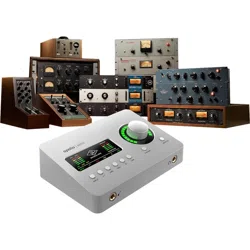Loading ...
Loading ...
Loading ...

Apollo Solo Manual Working With Apollo Solo 57
UAD Processing in DAW (Buffered)
When UAD plug-ins are used within compatible VST, AAX 64, or Audio Units host
DAW applications (i.e., outside of Console), monitored input signals are subject to I/O
buffering latency because the data must be shuttled back and forth between the DAW
and the audio interface.
The amount of input latency depends on the I/O buffer size setting (including when plug-
ins are not used, UAD or otherwise). As the buffer size is increased, more input latency
is induced. At lower buffer sizes, input latency is reduced but the host computer’s
CPU loads increase. With larger buffer sizes, input buffering latency makes software
monitoring via the DAW mixer while recording live inputs less practical — if the sound is
heard noticeably later than it is produced, it can compromise the performance.
Note that latency is not an issue during mixdown in a DAW because the performances
are already captured. The benefits of using Apollo Solo’s integrated DSP acceleration
when mixing with UAD plug-ins in the DAW include the off-loading of plug-in processing
from the host computer’s CPU, and the sonic rewards of UAD plug-ins.
DAW Processing Notes
• UAD plug-ins within a DAW are heard only when Apollo Solo and/or UAD-2 DSP
accelerators are active in the system. UAD plug-ins can be loaded in a DAW when
UAD DSP is unavailable, but they will not process audio.
• When monitoring or recording Apollo Solo’s inputs in a DAW, eliminate I/O
buffering latency by using Console for hardware input monitoring and Realtime
UAD Processing.
UAD Processing in both Console and DAW
UAD plug-ins can be used within Console and a DAW at the same time. In this scenario,
Apollo Solo’s UAD DSP resources are shared between the two host applications. Realtime
UAD Processing is available via Console, and I/O buffered (non-realtime) UAD processing
is available via VST, AAX 64, or Audio Units plug-ins in the DAW.
Note: UAD plug-ins within a DAW can also run at the same time as native (host
CPU based) plug-ins, in any combination.
Bypass UAD plug-ins within DAW when monitoring with Console
To maximize available DSP resources for UAD plug-in processing within Console when
monitoring, power off or unload UAD plug-ins in the DAW.
Bypass Console plug-ins when mixing in DAW
To maximize available DSP resources for UAD plug-in processing within the DAW when
mixing, power off or unload the UAD plug-ins in Console.
Tip: Use the “Disable All” feature within Console (see Channel Options) to quickly
disable/enable all UAD plug-ins within Console.
Loading ...
Loading ...
Loading ...
